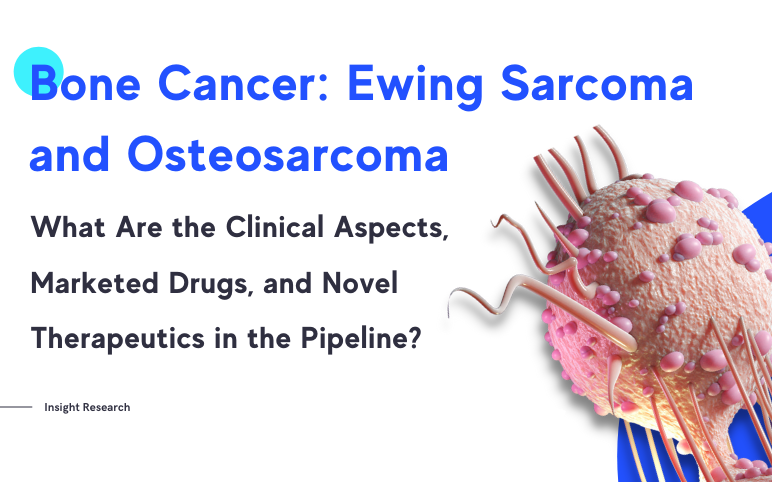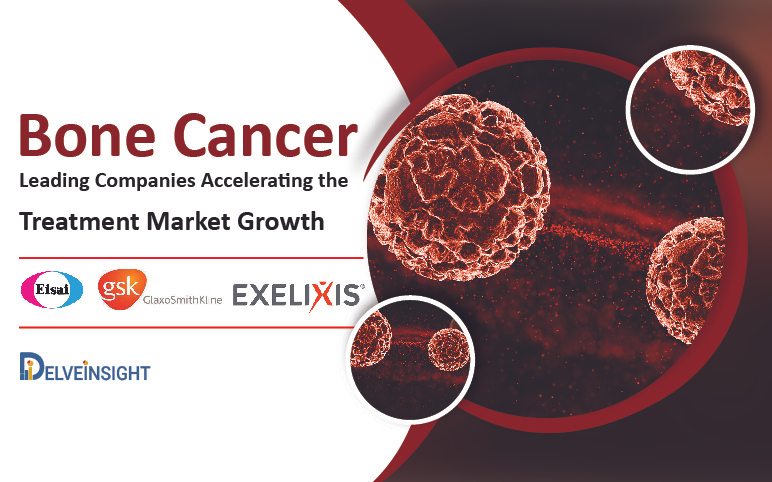Key Companies To Keep an Eye on for Pipeline Therapies in Osteosarcoma Market in the Next Decade
Oct 05, 2020
The current treatment approach for high-grade Osteosarcoma is conventional surgical resection of the primary tumor, along with systemic chemotherapies and radiation therapies in case of metastases and recurrence. Despite the rarity of Osteosarcoma, cancer poses a major global health burden with a global incidence rate of 5.6 cases per 1 million people (0-15 years of age).
Thus, any novel treatment under development in the Osteosarcoma market is eligible to earn Orphan drug status. The rare or orphan status of Osteosarcoma, however, has impacted the Osteosarcoma market in a somewhat negative way, as the revenue contribution from the Osteosarcoma pharmaceutical companies to the Oncology market is dimes as compared to companies developing therapies for relatively prevalent and frequent tumors.
A scour through the clinical trial registry revealed several clinical trials are undergoing evaluating multiple novel, as well as existing therapeutic strategies in Osteosarcoma, which will make Osteosarcoma patients’ see the light at the end of the tunnel in the near future. As per DelveInsight’s analysts, the Osteosarcoma therapeutic market in the 7MM was estimated to be USD 72.50 million in 2017 and is further expected to increase modestly in the forecast period 2020-30. The Osteosarcoma therapeutic market revenue is a collective revenue from metastatic as well as non-metastatic Osteosarcoma therapeutic market. Although several pharma companies such as Eisai Limited, Bayer, Exelixis, Nektar Therapeutics, Y-mAbs Therapeutics, GlaxoSmithKline, Novartis, Aadi Bioscience, Eleison Pharmaceuticals, Aurora biopharma, BioAtla, Iovance Biotherapeutics, Bristol-Myers Squibb, Cellestia Biotech are actively engaged in producing desirable pipeline therapies, however, DelveInsight believes the launch of Lenvatinib (Eisai Limited), Regorafenib (Bayer), Cabozantinib S-malate (Exelixis), Pazopanib Hydrochloride and Topotecan Hydrochloride (GSK), Bempegaldesleukin (NKTR-214) Plus Nivolumab (Nektar therapeutics) are major therapies that shall provide the needed momentum to Osteosarcoma market in the forecast period 2020-30. Among all the pharma companies most likely to bring home the bacon in the next decade, Exelixis‘s Cabozantinib S-malate, anticipated to be launched in the year 2023, has the potential to generate a hefty revenue of USD 4.45 million upon launch in the 7MM.
Downloads
Click Here To Get the Article in PDF
The companies in the Osteosarcoma market are primarily focusing on tackling the issues of drug-resistance, which is the major reason behind the failure of presently available adjuvant chemos in the Osteosarcoma treatment market. Besides, a diverse range of immunotherapeutic approaches are undertrials to fight Osteosarcoma. Past decades have also witnessed significant improvements in the medical science and genomic understanding of the tumor thus several genome-informed pathways and candidates are also in preclinical and clinical tests to target tumors.
Pharma companies working proactively to advance the Osteosarcoma market
Eisai is currently running Phase II trials of Lenvatinib (Lenvima), an anti-cancer drug, for relapsed and refractory Osteosarcoma. (NCT04154189). The trial is testing the efficacy and safety of ifosfamide and etoposide with or without lenvatinib. Lenvatinib is already approved for the treatment of progressive, radioiodine refractory differentiated thyroid cancer and for first-line treatment of patients with unresectable hepatocellular carcinoma (HCC).
Bayer is also testing its luck with its good old Regorafenib (Stivarga), which is an oral VEGF2-TIE2 receptor tyrosine kinase inhibitor (TKI). The drug is already approved for treatment-refractory metastatic colorectal cancer (mCRC), advanced gastrointestinal stromal tumors (GISTs) after imatinib and sunitinib, and unresectable hepatocellular carcinoma (HCC) following sorafenib in more than 90 countries. Currently, the company is running Phase II trials of development for the treatment of metastatic Osteosarcoma (NCT02389244). Bayer’s Aliqopa (copanlisib/ BAY80-6946), is also one of the contenders in the Osteosarcoma market. The drug is an intravenously bioavailable, small-molecule inhibitor of phosphatidylinositol-3-kinase (PI3K) with predominant activity against the PI3K-α and PI3K-δ isoforms. It is already commercially available in the Oncology market for the treatment of adult patients with relapsed follicular lymphoma (FL), and the company is running trials to expand its use. Aliqopa is in ‘phase I/II’ clinical trial for the treatment of osteosarcoma, neuroblastoma, rhabdomyosarcoma, and Ewing sarcoma (NCT03458728).
Another pharmaceutical titan, GlaxoSmithKline, in its quest to build a strong empire of cancer therapeutics, is testing its selective multitargeted tyrosine kinase inhibitor, Pazopanib Hydrochloride in the Osteosarcoma market. The drug, with proven therapeutic wonders in renal cell carcinoma; sarcoma, is in the Phase II clinical stage of development for the treatment of recurrent Osteosarcoma (NCT02357810).
Similarly, Exelixis is also among the pharma companies in the Osteosarcoma market, evaluating Cabozantinib (Cabometyx/ Cometriq), an inhibitor of MET, AXL, VEGF receptors, and RET, in Phase II trial in patients with relapsed osteosarcoma or Ewing sarcoma (NCT02243605), as well as in younger patients with recurrent, refractory, or newly diagnosed sarcomas, Wilms tumor, or other rare tumors including refractory Osteosarcoma (NCT02867592).
An advocate for developing innovative medicine to tackle serious disorders, Nektar Therapeutics is testing Bempegaldesleukin (NKTR-214), a CD122-preferential IL-2 pathway agonist, which activates the immune system to fight cancerous cells. The therapy is under investigation for several different tumors like melanoma, renal cell carcinoma, urothelial cancer, and Osteosarcoma.
A late-stage clinical biopharma company exploiting antibody-based therapeutic products for cancer, Y-mAbs Therapeutics is evaluating its lead candidate Naxitamab in Phase II clinical trial for the treatment of relapsed Osteosarcoma at Memorial Sloan Kettering Cancer Center (MSKCC). Naxitamab is a monoclonal antibody that works against the human tumor-associated antigen GD2, with potential antineoplastic activity. The company is also running trials evaluating the efficacy of the therapy in pediatric patients with relapsed or refractory high-risk neuroblastoma, and other GD2-positive tumors.
While all the companies are exploring familiar waters, Vaccinex, on the other hand, is spearheading a novel approach of inhibiting semaphorin 4D (SEMA4D), a key driver of neuroinflammation, which is also discovered to be leveraged by the tumor cells to block immune cell infiltration and escape the wrath of the immune system. The company is developing Pepinemab (VX15/2503) is an investigational drug currently in Phase II clinical studies for solid tumors including Osteosarcoma (NCT03320330) along with several neurological indications.
Besides the mentioned above, several other clinical trials are ongoing in the Osteosarcoma market. The promising outlook of the Osteosarcoma market has tracted several players already and many others are planning to enter through collaborations and partnerships. Pharma companies in the Osteosarcoma market are actively exploring multi-kinase inhibitors, checkpoint inhibitors, agents to disrupt angiogenesis, facilitate immune modulation, specific agents to target Osteosarcoma pathogenesis, and whatnot. With only a fewer treatment approaches and a grim past record of failure of novel treatment to make it to the finish line, the Osteosarcoma market is not less than fertile soil, offering Pharmaceutical companies round the world to sow the seeds of therapeutic agents and reap the benefits of market share.
Albeit, once a universal fatal cancer, today, most of the Osteosarcoma patients manage to live a life with a relatively better quality of life, even then, the chances of tumor recurrence are quite high, and Osteosarcoma continues to be recognized as the third most common solid childhood cancer. There is a lot left to achieve in the treatment landscape of the tumor in terms of prolonged survival rate, tumor-free life, and halting the progression of Osteosarcoma. The Pipeline therapies in the Osteosarcoma market are still in clinical development phases, and which therapy receives the approval from the regulatory authority is yet to watch out.




